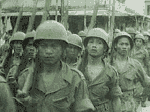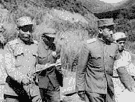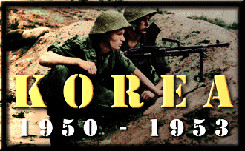The Land War

At 4am on 25th June 1950, without prior ultimatum or declaration of war, North Korea invaded the Republic of South Korea, launching a well co-ordinated, full-scale attack both on the ground and in the air. President Trumans response was swift, he ordered General MacArthur to defend South Korea with air and naval forces out of Japan as he called his Allies. Due to the fear of Soviet attacks, the British could only spare a single carrier group for the operations, the United States Navy sent in the Seventh Fleet.
Due to the the Korean War, China was forced to indefinitely postpone its invasion of Taiwan and instead make preparations to defend its Korean borders. This solidified the Russian-Chinese communist pact and prevented a Russo-chinese split over Communism. In a monumental mistake, the Soviet ambassador to the United Nations did not attend the UN Security Council meeting on North Korea, on Stalins' orders, thereby preventing the veto of the UN resolution on the invasion. Thus, the UN Resolution was passed, and UN Forces were deployed to Korea under General MacArthur.

Over the summer of 1950, the North Korean forces pushed into the South, reducing the United Nations troops into a less than 50-mile perimeter around Pusan. With a daring amphibious landing at Inchon, The United Nations forces smashed across the Korean Peninsular cutting the North Korean supply lines. On 15th September 1950, the Amphibious landings began at Inchon at high tide, encountering only light resistance from the unprepared North Korean troops.

On 25th September, the UN-US force liberated the city of Seoul, the resistance was heavy and the eventual liberation resulted in at least fifty thousand civilians killed in the crossfire. With the UN triumphant and the north koreans in retreat, the Russians pulled out. When the Un reached the 38th parallel, a difficult decision presented itself. The invaders had been expelled from the territory invaded, but Rhee, burning to re-unite Korea, had no doubt that re-occupying the South was only the first step. On 1st October, the Un crossed the 38th parallel and entered North Korea. Stalin decided that China must rescue North korea, as he was unwilling to risk going up against the Un on his own, if American attacked into China the communist world would be united against the United States.

On 19th October, the UN and South korean troops captured the north korean capital of Pyongyang. Washington dismissed the possibility of China entering the conflict as bluff, and in Mid-October the first Chinese volunteers crossed the Yalu River into North korea. On 25th October, after a engagement between US and Chinese troops the US captured some prisoners, this revealed that China had entered the war. After several days of fighting the Chinese withdrew, having blooded the United Nations. On 26th November, the chinese launched a full-scale assault. Pouring out of the mountains where they had been massing, vast numbers of Chinese soldiers engulfed the front-line units. The UN suffered vast casualties, and then Winter hit. On 6th December, Pyongyng was recaptured by Chinese troops. Not that there was much left of it, after the UN capture and retreat.

Early in January 1951, the Chinese launched another offensive. On 4th January 1951 Seoul fell for a second time to the Communists. The remains of Inchon were torched by retreating soldiers, and this marked the end of the Chinese assault as a newly invigorated UN army faced them. The tide turned again, the EIghth Army retaking Inchon on 10th February 1951, and Seoul on 14th March. The 38th Parallel was reached later in March.

In April, General MacArthur was sacked and General Ridegway replaced him as UN Commander in Korea, mainly because of his view of attacking China directly and risking direct conflict with the USSR, which Washington did not want. Later in the month, half a million communists threw themselves at the UN lines, the Un suffered great casualties and thousands were taken prisoner. In the Hill around the Imjin River, Soldiers of the Gloucester regiment, facing vastly superior Chinese numbers, displayed great heroism before being almost wiped out as a military force. As the Communists reached Soeul's suburbs, the UN line held.

Armistice talks began at Kaesong in July 1951. The US feared that the chinese and North Koreans might use this respite as an opportunity to regroup and reequip. When the UN was accused of violating the neutral zone and suspended the talks. The war continued. The fall of 1951 saw both sides ready to fight from well-prepared, well dug-in trenches. The UN forces were a half a million strong, properly supplied and well armed, and their field artillery kept the Communist troops pinned down in their positions. As Russian and Chinese Migs clashed overhead with American Sabres, the US Air Force kept up a massive bombing campaign, which devastated the cities of North Korea. More than 600,000 tons of bombs fell on the North, and subsequently a good proportion of the North Korean industry went underground.

Throughout the war, both North korea and Russia were constantly demanded more resources from Russia, with Russia demanding payment in hard cash. Armistice talks began again in October 1951. As the talks continued, bitter fighting raged. In the end, elected President in November 1952, Dwight D. Eisenhower threatened Beijing with nuclear weapons in May 1953 and Stalin Died in Moscow in March 1953, Moscow ordered an end to the war within a fortnight of Stalin's death.



